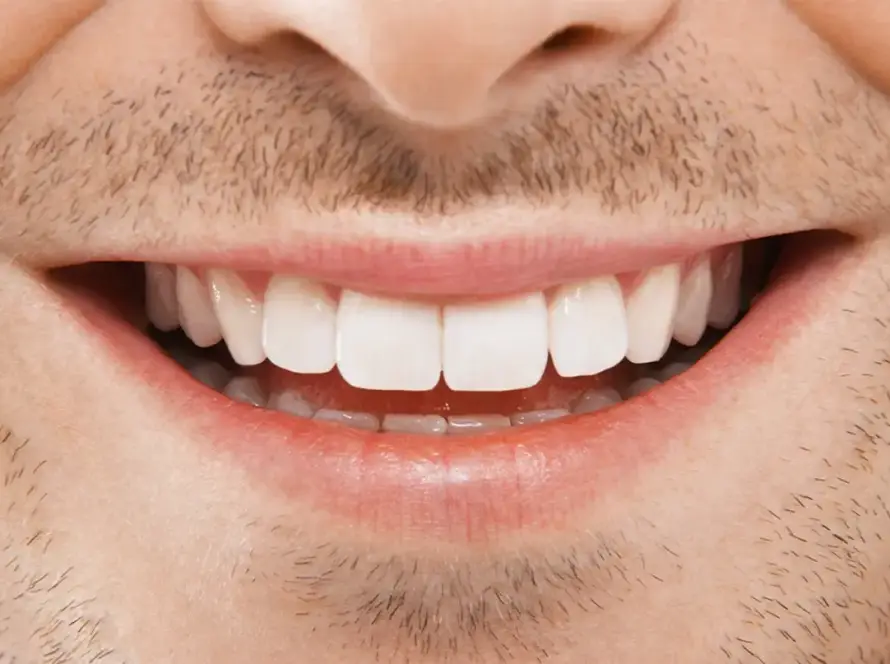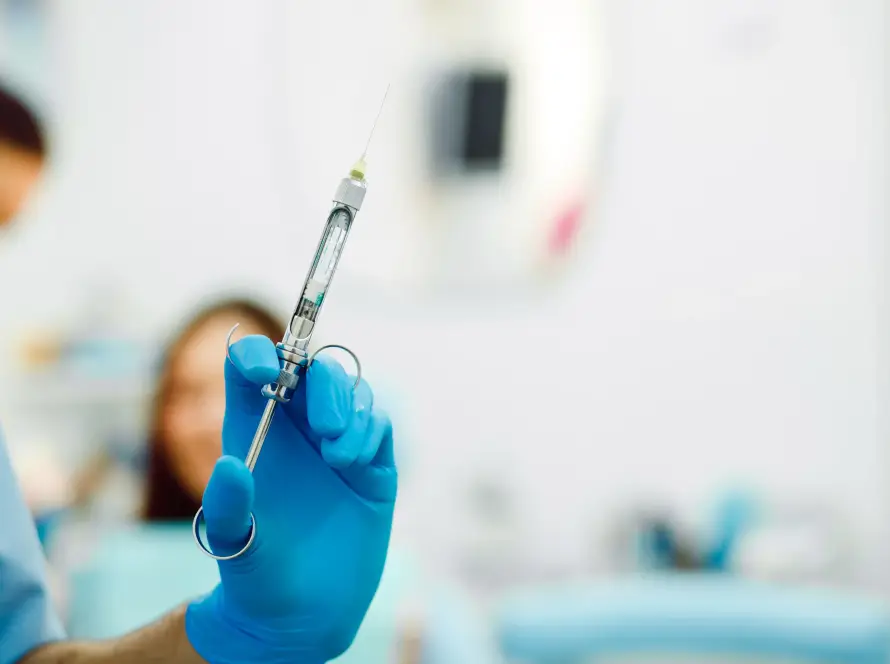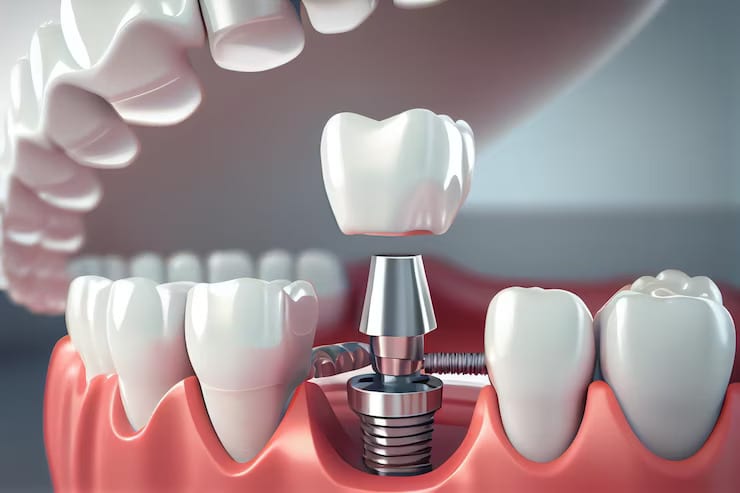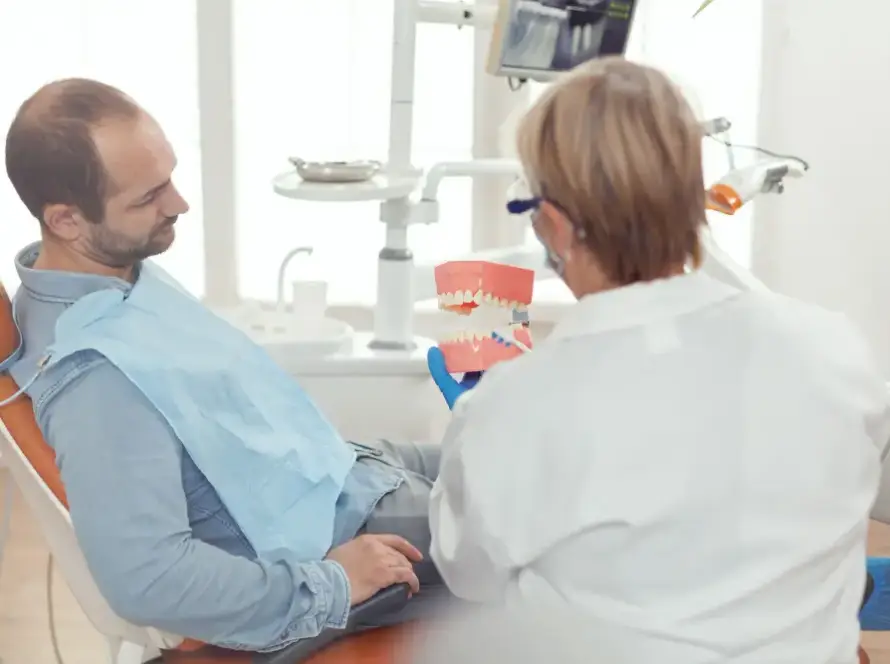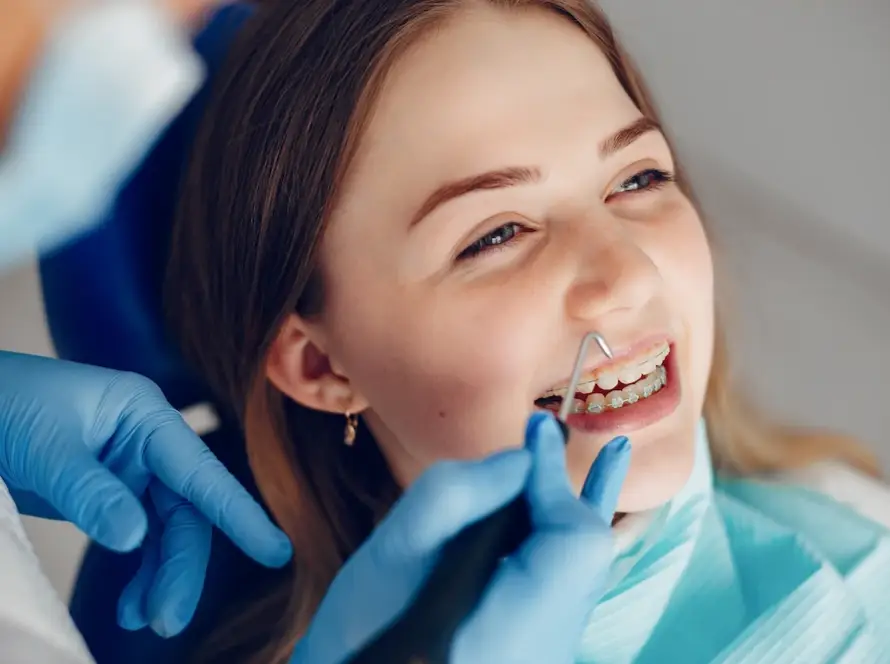Laser teeth whitening is a popular cosmetic dental treatment that aims to restore the natural color of teeth by removing stains and discoloration. It involves the use of a laser, specifically a highly concentrated beam of light, to activate a whitening gel applied to the teeth.
The procedure is performed in a dental office by a trained professional. Prior to the treatment, a thorough dental examination is conducted to ensure the patient’s oral health is in good condition. The dentist will also assess the overall suitability of the patient for the procedure.
Laser teeth whitening offers several advantages over traditional teeth whitening methods. It is a faster and more efficient process, with results often noticeable after just one session. The use of laser technology allows for precise targeting of the whitening gel, reducing the likelihood of damage to surrounding tissues.
Moreover, laser teeth whitening is considered safe when performed by a trained and experienced dentist. The procedure has been widely studied and has shown minimal adverse effects, such as temporary sensitivity or gum irritation, which typically subside shortly after treatment.
It is important to note that laser teeth whitening is not suitable for everyone. Pregnant or breastfeeding women, individuals with extensive dental restorations, and those with certain oral conditions may not be eligible for the procedure. Therefore, a comprehensive consultation with a dental professional is essential to determine if laser teeth whitening is a suitable option.
In the following sections, we will delve deeper into the safety considerations of laser teeth whitening and address common concerns regarding its potential side effects. Understanding the safety of this popular cosmetic dental treatment is crucial in making an informed decision about improving the brightness of your smile.
How Does Laser Teeth Whitening Work?
Laser teeth whitening is a cosmetic dental procedure that can effectively lighten the color of your teeth. This treatment relies on the use of a specialized dental laser that emits a concentrated beam of light. The process starts with a dental professional applying a whitening gel to the surface of your teeth. This gel contains a hydrogen peroxide or carbamide peroxide solution, which is activated by the laser light.
When the laser is directed at the teeth, it activates the whitening gel, causing a chemical reaction that breaks down the discolored molecules on the tooth surface. The laser light helps to speed up the whitening process, allowing for faster and more dramatic results compared to other methods.
The laser energy also helps to penetrate the tooth enamel, allowing the whitening gel to reach deeper layers of the tooth. This ensures that stains and discoloration are effectively treated, resulting in a brighter and more youthful smile.
It is important to note that laser teeth whitening is typically performed in a dental office under the supervision of a trained professional. The procedure is safe and generally well tolerated by patients. However, it is important to follow the dentist’s instructions and recommendations for post treatment care to ensure optimal results and minimize any potential risks.
Overall, laser teeth whitening is an effective and efficient way to transform the appearance of your teeth and boost your confidence. With the right professional guidance and aftercare, you can achieve a significantly whiter smile in just one or a few visits to the dentist.
The Safety of Laser Teeth Whitening
- Controlled and precise procedure: Laser teeth whitening is considered a safe dental procedure when performed by trained professionals. The use of laser technology allows for precise control over the whitening process, minimizing the risk of damage to the teeth and gums.
- Minimal discomfort and sensitivity: Compared to other teeth whitening methods, laser teeth whitening typically causes minimal discomfort and sensitivity. The laser energy targets the teeth’s surface, breaking down stains without causing significant harm. Dentists often use protective measures such as dental dams to shield the gums and minimize any potential side effects.
- Reduced risk of gum irritation: With laser teeth whitening, there is a reduced risk of gum irritation compared to other bleaching methods. The laser energy is focused solely on the teeth, minimizing contact with the gums and reducing the chances of inflammation or discomfort.
- Shorter treatment time: Laser teeth whitening procedures often require shorter treatment times compared to traditional methods. The concentrated laser energy allows for quick and efficient stain removal, reducing the overall time patients spend in the dental chair.
- Long lasting results: Laser teeth whitening treatments provide long lasting results, allowing patients to enjoy a brighter smile for an extended period. The laser energy helps break down deep seated stains, resulting in a more thorough and lasting whitening effect.
- Dental professional supervision: Undergoing laser teeth whitening ensures that the procedure is performed under the supervision of a dental professional. They have the necessary knowledge and expertise to assess the condition of the teeth and gums, ensuring the treatment is safe and tailored to each patient’s needs.
It is important to note that while laser teeth whitening is generally safe, individuals with certain dental conditions or sensitivities may not be suitable candidates. It is always advisable to consult with a dentist before undergoing any teeth whitening treatment to assess suitability and discuss potential risks or alternatives.
Benefits of Laser Teeth Whitening
Laser teeth whitening offers several benefits that make it an attractive option for those seeking a brighter smile. Here are some of the advantages that come with this popular dental procedure:
- Effective and Immediate Results: Laser teeth whitening is known for delivering dramatic results in just one session. The powerful light emitted by the laser accelerates the whitening process, allowing for noticeable improvements in the color of your teeth right away.
- Customizable Treatment: With laser teeth whitening, the intensity of the laser light can be adjusted to suit your specific needs. This means that your dentist can tailor the treatment to address your unique staining or discoloration issue, ensuring optimal results.
- Safe and Non Invasive: Laser teeth whitening is a safe and non invasive procedure that does not require any surgery or injections. Unlike some other whitening methods, it does not damage the enamel or cause sensitivity, making it a suitable option for most individuals.
- Minimal Discomfort: While some individuals may experience slight sensitivity during or after the treatment, laser teeth whitening is generally considered to be a comfortable procedure. Dentists often apply a protective gel or shield to minimize any potential discomfort.
- Long Lasting Results: The results of laser teeth whitening can last for an extended period, particularly when coupled with good oral hygiene practices and regular dental check ups. By avoiding foods and beverages that stain and following the dentist’s recommendations, you can maintain your newly brightened smile.
- Improved Self Confidence: A whiter smile can provide a significant boost to your self confidence and overall appearance. Laser teeth whitening can remove deep stains and discoloration, helping you achieve a radiant smile that you can proudly show off.
- Professional Supervision: Laser teeth whitening is typically performed by trained dental professionals who have expertise in the procedure. This ensures that you receive safe and effective treatment while minimizing the risk of complications.
In conclusion, laser teeth whitening offers numerous benefits, including immediate results, customization, safety, minimal discomfort, long lasting effects, improved self confidence, and professional supervision. This makes it a highly appealing option for individuals seeking a brighter, more beautiful smile.
Risks and Side Effects to Consider
When considering laser teeth whitening, it is important to be aware of the potential risks and side effects associated with the procedure. While laser teeth whitening is generally considered safe, there are a few considerations to keep in mind.
- Sensitivity: One common side effect of laser teeth whitening is tooth sensitivity. Some individuals may experience temporary sensitivity to hot or cold foods and beverages immediately after the treatment. However, this sensitivity usually subsides within a few days.
- Gum Irritation: Another possible side effect is gum irritation. The laser used during the whitening process may cause temporary irritation to the gums, resulting in redness or soreness. This is typically mild and resolves on its own within a few days.
- Tooth Sensation: In rare cases, laser teeth whitening may cause a change in tooth sensation. Some individuals may experience increased sensitivity or a tingling sensation in their teeth. This side effect is usually temporary, but it is important to consult with a dental professional if it persists.
- Color Variations: It is important to note that the results of laser teeth whitening may vary from person to person. In some cases, individuals may not achieve the exact shade of white they desire. Additionally, existing dental restorations, such as dental crowns or veneers, may not respond to the whitening treatment, resulting in uneven coloration.
- Risk of Gum Burns: While rare, there is a small risk of gum burns during laser teeth whitening if the procedure is not conducted properly. This emphasizes the importance of seeking treatment from a trained and experienced dental professional to minimize this risk.
- Post Treatment Care: After undergoing laser teeth whitening, it is necessary to avoid consuming foods and beverages that may stain the teeth for at least 24 to 48 hours. This includes coffee, tea, red wine, and tobacco products. Maintaining good oral hygiene, including regular brushing and flossing, is also crucial to prolong the effects of the whitening treatment.
It is essential to have a thorough discussion with a dental professional before deciding to undergo laser teeth whitening. They can assess the potential risks and side effects based on your dental health and determine if this procedure is suitable for you.
Understanding the Procedure
Laser teeth whitening is a safe and effective procedure that can help you achieve a brighter and more confident smile. Here’s a step by step breakdown of how the procedure works:
- Evaluation: Before the treatment, you will have a consultation with a dental professional who will assess your oral health and determine if you are a suitable candidate for laser teeth whitening. They will also discuss your expectations and explain the procedure in detail.
- Preparation: During the procedure, your dentist will protect your lips, gums, and tongue by applying a barrier or dental dam. This is to ensure that only your teeth are exposed to the whitening gel and laser light.
- Whitening gel application: A highly concentrated whitening gel containing hydrogen peroxide will be applied to the surface of your teeth. This gel is specially formulated to break up the stains and discoloration on your enamel.
- Laser activation: After the gel is applied, a dental laser will be used to activate the gel and enhance its whitening effects. The laser light helps to speed up the whitening process by accelerating the chemical reaction of the gel.
- Multiple sessions: Depending on the severity of the stains and your desired results, you may need to undergo multiple sessions of laser teeth whitening. Each session typically lasts between 30 minutes to an hour.
- Protection and aftercare: Once the desired level of whitening is achieved, your dentist will remove the whitening gel and protective barriers. They may also provide you with a desensitizing treatment to help minimize tooth sensitivity after the procedure. Your dentist will also provide you with instructions on how to maintain your newly whitened teeth and avoid staining foods and drinks.
It is important to note that laser teeth whitening is a cosmetic procedure and may not be suitable for everyone. Individuals with severe tooth sensitivity, gum disease, or dental restorations may not be eligible for this treatment. It is always best to consult with a dental professional to determine the most appropriate whitening option for your individual needs.
Is laser teeth whitening safe?
Laser teeth whitening is considered to be a safe and effective treatment when performed by qualified dental professionals. Here are some important aspects to consider regarding the safety of laser teeth whitening:
- Professional supervision: Laser teeth whitening should always be carried out under the supervision of a trained dental professional. They have the expertise and knowledge to determine the appropriate treatment for each individual and can monitor the process to ensure safety.
- Minimal discomfort: Laser teeth whitening is generally well tolerated by patients and causes minimal discomfort. The procedure involves the application of a whitening gel to the teeth, which is then activated by a laser. Some patients may experience temporary teeth or gum sensitivity, but this is usually mild and resolves quickly.
- Controlled application: The laser used in teeth whitening is carefully calibrated to provide the right amount of energy for optimal results while minimizing any risks. The dental professional can control the intensity and duration of the laser, ensuring a safe and controlled treatment.
- Safe for teeth and gums: Laser teeth whitening treatments are designed to be safe for both the teeth and gums. The whitening gel used in conjunction with the laser is specifically formulated to minimize potential harm to the enamel. Additionally, protective measures, such as the use of barriers and isolation techniques, are often employed to shield the gums from any potential irritation.
- Short treatment time: Laser teeth whitening is a quick procedure, typically lasting between 30 to 60 minutes. This means that exposure to the laser is limited, reducing the potential for any adverse effects.
- Long lasting results: Laser teeth whitening treatments can provide long lasting results, with teeth remaining significantly whiter for an extended period. This means that fewer treatments may be required, further minimizing any potential risks associated with the procedure.
While laser teeth whitening is generally safe, it is still essential to consult with a dental professional before undergoing any whitening treatment. They can assess your oral health, discuss any concerns or sensitivities you may have, and determine if laser teeth whitening is a suitable option for you.

